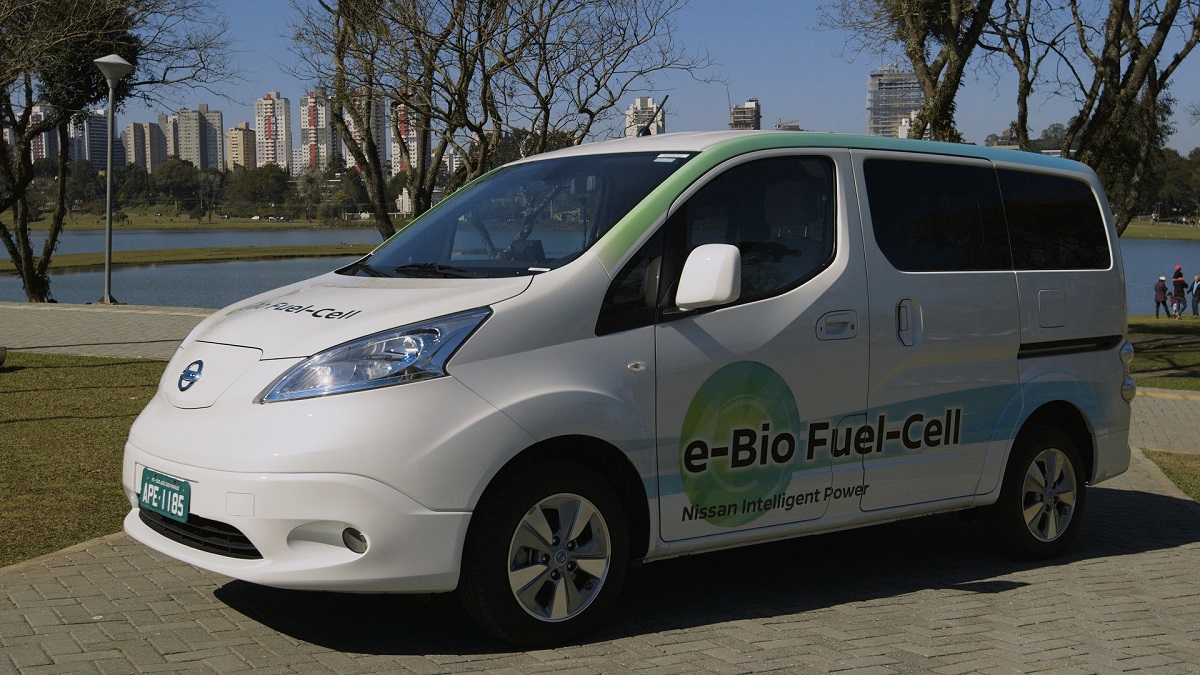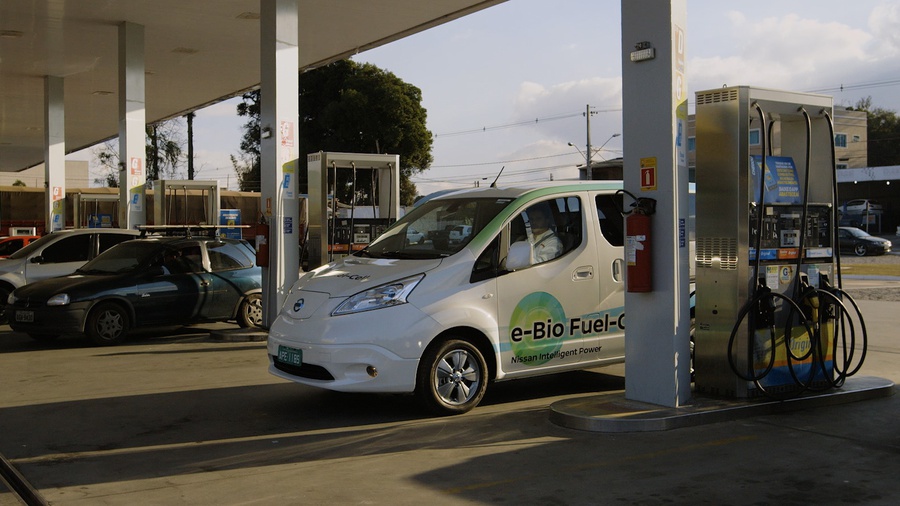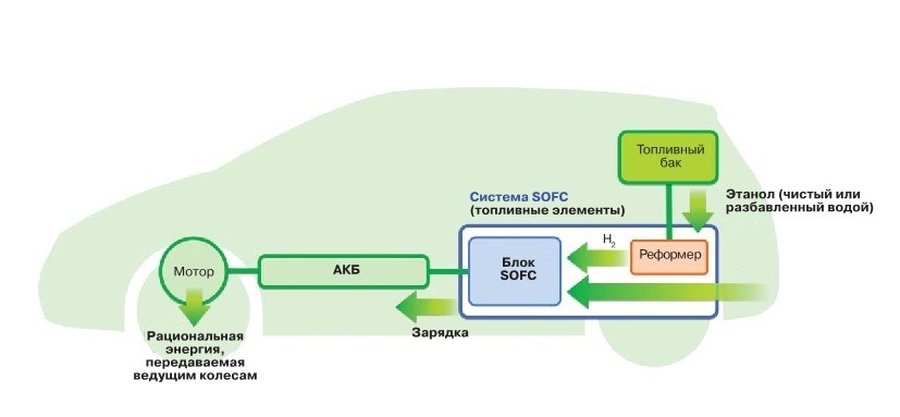Новый прототип Nissan построен на базе минивэна e-NV200 с литий-ионной батареей ёмкостью 24 кВт⋅ч. У серийного электромобиля запас хода по европейскому циклу NEDC составляет 170 км, однако пробег экспериментальной машины удалось увеличить до 600 километров без каких-либо изменений аккумуляторов. Секрет такой дальнобойности заключается в использовании установки с твердооксидными топливными элементами (Solid Oxide Fuel-Cell, SOFC), о разработке которой компания Nissan сообщила в июне этого года.
В минивэн установлен дополнительный топливный бак ёмкостью 30 л, который заправляется популярным в Южной Америке биоэтанолом. Полученный из переработанного тростника, сои или кукурузы спирт разлагается в реакторе на водород и углекислый газ. Затем водород и атмосферный кислород поступают в топливные ячейки, где в результате химической реакции вырабатывается электрический ток, который заряжает батарею во время движения и сокращает время зарядки от внешних источников. Небольшие объёмы СО2, как отмечают в Nissan, компенсируются ростом растений, которые используются для создания биоэтанола.
Дополнительная энергетическая система пока достаточно массивная, поэтому в менее крупные модели, тот же Nissan Leaf не поместится. Впрочем, исследования в этом направлении пока находятся на ранних этапах. В Nissan рассчитывают, что на серийных электромобилях SOFC-системы могут появится в ближайшие пять лет, причем для этого не потребуется создавать дополнительную инфраструктуру, поскольку биоэтанол свободно продается уже сегодня.
Nissan unveils world’s first Solid-Oxide Fuel Cell vehicle
Cruising range Of 600km-plus for zero-emission Bio-Ethanol Fuel-Cell model
Yokohama, Japan (August 4, 2016) – Nissan Motor Co., Ltd. today revealed the world’s first Solid Oxide Fuel-Cell (SOFC)-powered prototype vehicle in Brazil that runs on bio-ethanol electric power.
The breakthrough model, an all-new light–commercial vehicle, can rely on multiple fuels, including ethanol and natural gas, to produce high-efficiency electricity as a power source.
Nissan president and CEO Carlos Ghosn said: “The e-Bio Fuel-Cell offers eco-friendly transportation and creates opportunities for regional energy production…all the while supporting the existing infrastructure. In the future, the e-Bio Fuel-Cell will become even more user-friendly. Ethanol-blended water is easier and safer to handle than most other fuels. Without the need to create new infrastructure, it has great potential to drive market growth.”
Specifications
Base vehicle e-NV200
Battery capacity 24 kWh
Energy source Electricity, Ethanol
Tank capacity 30 L
SOFC output 5 kW
Driving range 600 km-plus
*Note due to it being a prototype vehicle, specifications are subject to change
The fuel cell prototype forms part of Nissan’s ongoing commitment to the development of zero-emission vehicles and new automotive technologies including autonomous drive systems and connectivity. Nissan already sells the world’s highest-volume zero-emission car, the LEAF, and is pioneering Intelligent Mobility systems that will be deployed in a range of vehicles over coming years.
In this latest zero-emission development, the e-Bio Fuel-Cell prototype vehicle runs on 100-percent ethanol to charge a 24 kWh battery which enables a cruising range of more than 600km. Nissan will conduct further field tests on public roads in Brazil using the prototype.
Research and development of the e-Bio Fuel-Cell was announced by Nissan in June in Yokohama. The powertrain is clean, highly-efficient, easy to supply, and runs on 100-percent ethanol or ethanol-blended water. Its carbon-neutral emissions are as clean as the atmosphere, which will be the part of natural carbon cycle. Also, the e-Bio Fuel-Cell offers the brisk acceleration and silent driving of an EV, along with its low-running costs, while boasting the driving range of a gasoline-engine vehicle.
Bio-ethanol fuels are mainly sourced from sugarcane and corn. These fuels are widely available in countries in North and South America, which feature widely-established infrastructure. Due to the easy availability of ethanol and low combustibility of ethanol-blended water, the system is not heavily dependent or restricted by the existing charging infrastructure, making it easy to introduce to the market. In the future, people may only need to stop by small retail stores to buy fuel off the shelf.
In pursuit of realizing a zero-emission and zero-fatality society for cars, Nissan continues to promote vehicle intelligence and electrification. Nissan’s brand promise of “Innovation That Excites” is delivered with “Nissan Intelligent Mobility”, which focuses on how cars are powered, driven and integrated into society through a more enjoyable driving experience.
The e-Bio Fuel-Cell will realize the concept of “Nissan Intelligent Power,” promoting greater efficiency and electrification of cars and the joys of driving, alongside battery EVs, such as the “Nissan LEAF”, “Nissan e-NV200,” and “e-Power,” which is equipped with an engine housing an exclusive large-capacity motor and power generator.
Nissan will continue to provide value to its customers by incorporating systems that enable the extraction of electric power from various fuels, while addressing the infrastructure issues tied to energy supply in every region of the world.







Citroen C3 Picasso 2013
Интересно посмотреть на сравнение такой схемы против обычного генератора на спирте. Вес, объем и КПД.
Ведь не зря бмв i3 так сделали.
Toyota Camry '98
Смутная получается экономия. Как я понимаю, расход где то 30 литров биоэтанола на 600 км пробега, или 5 л на 100 км.
Тот же Фиат Добло, аналогичный по вместимости, кушает около 6 литров дизеля на 100 км.
При этом стоимость биоэтанола у нас не ясна, но загуглив, можно увидеть цену аналогичную ДТ.
А учитывая громоздкость и наверняка сложность обслуживания установки, получается пшик.